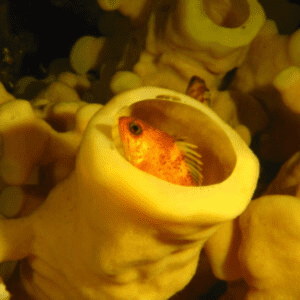Among the BC coast’s varied marine species, squid play a fascinating and vital role in maintaining the ecological balance of our coast.
What are the Different Kinds of Squid in BC?
BC’s marine ecosystems are home to several squid species, each with its own intriguing traits. Notable among them are the Market Squid (Doryteuthis opalescens), known for its economic value; the Humboldt Squid (Dosidicus gigas), famed for its size and feared for its supposed aggressiveness to humans; and the bioluminescent Neon Flying Squid (Ommastrephes bartramii), which can propel itself out of the water.
Market Squid
The market squid is the most common squid species in BC. Market squid may appear as unassuming as squid come, but they are actually voracious predators. They can consume an impressive 14% of their body weight daily, feeding on fish, crustaceans, and even fellow squid. They hunt in groups and work together to take down larger prey. Their advantage, aside from numbers? The cover of night and swiftness. They drag their prey back into the dark and, together, slice up their prey with their sharp, beak-like jaws and grind the meat down with their rough radula and sharp teeth.
Humboldt Squid
These behemoths were once found no further north than California. However, this warm water species has been spotted along BC’s coast in recent years, a sign of how climate change is changing habitats worldwide. Humboldt squids have a complicated reputation. Not only are they perceived as being particularly aggressive to humans, especially scuba divers, but they have also been implicated in decimating populations of smaller fishes and squids. The truth is that it is not all the Humboldt squid’s fault. Firstly, they are likely only aggressive toward humans when we interrupt their feeding sessions. In addition, Humboldt squids are a very productive species, and their sizes make it so that only giant predators, like whales and sharks, can prey on them. The decline of these larger predators due to human activity has likely contributed to Humboldt squid population increases, affecting Humboldt squid prey’s survivability.
Neon Flying Squid
You know what they say, the brightest stars burn the fastest. This beautiful squid species only lives for about a year. Not only does it sport vibrant pink, purple, or blue colouration, it also actually flies–well, about as well as a marine animal can. Neon flying squid are highly migratory, moving often between their feeding and spawning grounds. As they travel through the waters, they breach the water and “fly” out upwards of 30 metres high and at a speed of 11.2m per second.
We Have a Complex Relationship With Squid
Squid have been included in the diets of BC’s Indigenous communities for thousands of years. There is documentation that Haihais, Bella Bella (Hieltsuk), Oowekeeno (Hieltsuk), and Coast Salish have historically consumed squid. These documents note that the preferred methods of preparation by the Coast Salish are boiling, steaming, and roasting.
Squid are primarily fished as bait for other species as they make up a sizable part of the diets of many other marine species. However, their apparent abundance has meant that governments do not dedicate much time to tracking or regulating the numbers of squid in Canadian waters and how much of that is being fished.
This could explain in part why we consistently find it so difficult to predict or understand the apparently huge fluctuations in squid populations. Time and again, reports of potential squid population declines are contradicted by reports of an overabundance of squid. Neither scenario is good for our oceans.
Claims of a booming global squid fishery, driven by governments’ inability or unwillingness to keep pace with the relentless drive of industrial fishing, should serve as a warning sign for BC. Foreign industrial squid jiggers intentionally venture out to the high seas where governments have no oversight, particular around South America. Considering how sensitive squid are to their environments and how the littlest things, such as an increase in ocean temperatures by one or two Fahrenheit, can result in their population boom or bust (the decline of Atlantic Canada’s squid fishery in the ‘80s is testament to this), we should be prepared for the effects of this international squid jigging phenomenon to reverberate in BC from outside our boundaries. While squid jigging of this massive industrial scale does not currently exist on our waters, there have been considerations in the past for the commercialization of a directed squid jigging fishery in BC.
We Need to Pay More Attention to Squid
Squid show the other side of how human activity impacts our world. This isn’t your usual story of a population collapsing and local communities banding together to save that species. The narrative is a little more complex with squid. Squid could very well thrive in a world ravaged by climate change. We can’t rely on their cannibalistic tendencies for them to self-regulate, not when the biodiversity that is so crucial to our economic survival hangs in the balance.
Squid are prolific predators, and a significant increase in their population could lead to over-predation on their prey species, affecting population dynamics. Furthermore, this could result in competition with other predators, including commercially important fish species like sardines and tuna or vulnerable species like whales, for food resources.
The kicker to all this is that there is little to no data on squid in BC and how they are changing in an environment that is increasingly changed by human activity.
Marine Protected Areas (MPAs) offer a promising strategy for monitoring squid populations in BC. Without any form of oversight, we will continue having to play guessing games. Can we afford to wait until our waters are overrun by squid?
Squid in BC are integral to cultural traditions and the marine ecosystem, which makes them a key player in local economies. If the population of squid either decline or increase dramatically, there will be a domino effect all throughout the food chain. Understanding the diversity, ecological roles, and the challenges squid face is crucial for the sustainable management of marine resources. Through continued research, conservation efforts, and the implementation of marine protected areas, BC can protect our rich marine biodiversity, ensuring a balanced and productive ocean environment for future generations.
To learn more about marine protected areas and how they work, check out this article.




